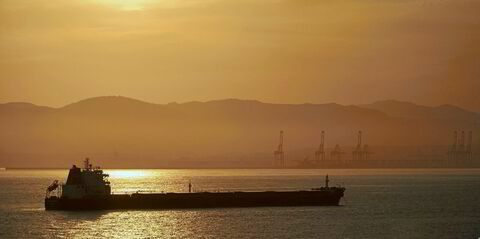The results are in and the majority of TradeWinds readers clearly believe scrubbers are bad for the environment.
Scrubbers are a hoax, they pollute the sea.
In a poll on this website, opinions were sought on the burning issue of the day for the industry.
There have been strong views expressed on both sides of the scrubber divide.
Euronav chief Paddy Rodgers has been the chief critic and Star Bulk president Hamish Norton an outspoken cheerleader for the technology.
On the main question of whether scrubbers are a bad bet environmentally,two thirds of those taking part said they agreed.
"Putting crap in the ocean cannot be the answer," said one reader.
Another respondent said: "People in favour of scrubbers say the added sulphur is doing no harm to the oceans and I agree. It is much more about the heavy metals like vanadium.
"Hamish Norton compares the discharge water from his vessels with San Pellegrino. In terms of sulphur that might be correct, but San Pellegrino does not corrode ordinary valves and pipes within weeks and I highly doubt he would take a sip of discharge water with his Vitello Tonnato."
Another said: "We sampled and modelled the impact on the water body. It was not good..."
"Scrubbers are a hoax, they pollute the sea," was another comment received.
The ocean is the best place for the sulphur present in crude oil. It is not a pollutant - it is a natural constituent.
One reader in favour of the exhaust cleaners said: "Better in the sea where it occurs naturally than in the air where it doesn't."
Scientific debate solved?
One impressively informed reader said: "Documented EPA and governmental studies show exhaust gas systems, including open-loop, discharge sulphate (not Sox) in the sea.
"Sulphates are not harmful to the marine natural elements and PH is naturally neutralised by alkalinity of the sea under turbidity."
And a scrubber backer said: "The ocean is the best place for the sulphur present in crude oil. It is not a pollutant - it is a natural constituent.
"The alarmist anti-scrubber voices are those who have taken the business decision against scrubbers and then are trying to create an environmental argument to justify it."
History's verdict
The second question - whether history would frown on shipowners who opt for scrubbers - was much closer.
A total of 53% believed it would, while 47% disagreed.
One respondent thought owners would be seen as people "who had much at stake and had to decide according to their beliefs, fears and long-term strategies."
Another said: "Replacing atmospheric pollution to ocean pollution won't be accepted by the general populace."
But another was more pragmatic, adding: "Even though open-loop is bad for the environment, if it is on the menu, then one is entitled to order it."
History will frown on those parties that create a false environmental argument against prevailing science to promote their business decisions.
"False argument"
And one reader said it was "ridiculous" that posterity would judge owners badly.
"History will frown on those parties that create a false environmental argument against prevailing science to promote their business decisions," the respondent claimed.
On the question of whether scrubbers are the best alternative available to meet the requirements of IMO 2020, readers disagreed by a margin of 67% to 33%.
"They are a disgrace," said one.
Respondents viewed MGO, LNG or sulphur credits as better alternatives.
But one said scrubbers are the best solution for now, "until cheaper alternatives occur."
The verdict on whether owners are installing scrubbers purely for economic reasons was very clear, with 76% agreeing.
Are owners hypocrites?
One reader said: "Clearly! Nothing to do with environment. That's pure hypocrisy."
Another called the technology "a cynical and immoral workaround."
And another said economic reasoning was "the one thing that truly motivates shipowners."
But another was more balanced, saying the choice was being made "also for stability of the engine while blends' compatibility and MGO impact on engines can raise stability issues on navigation.
If profits [arise], those can be re-invested in more ambitious long-term decarbonising technologies."






